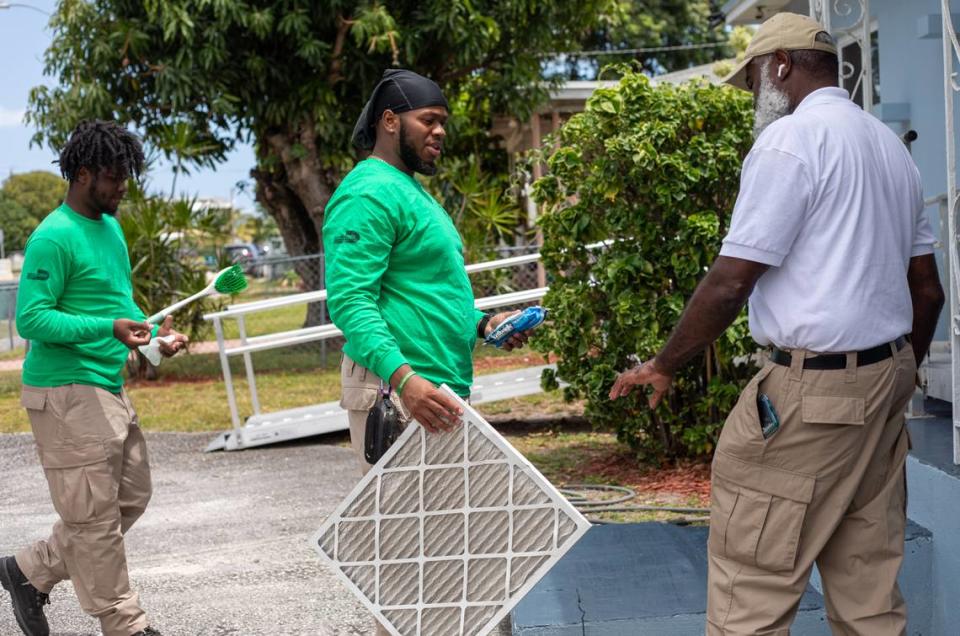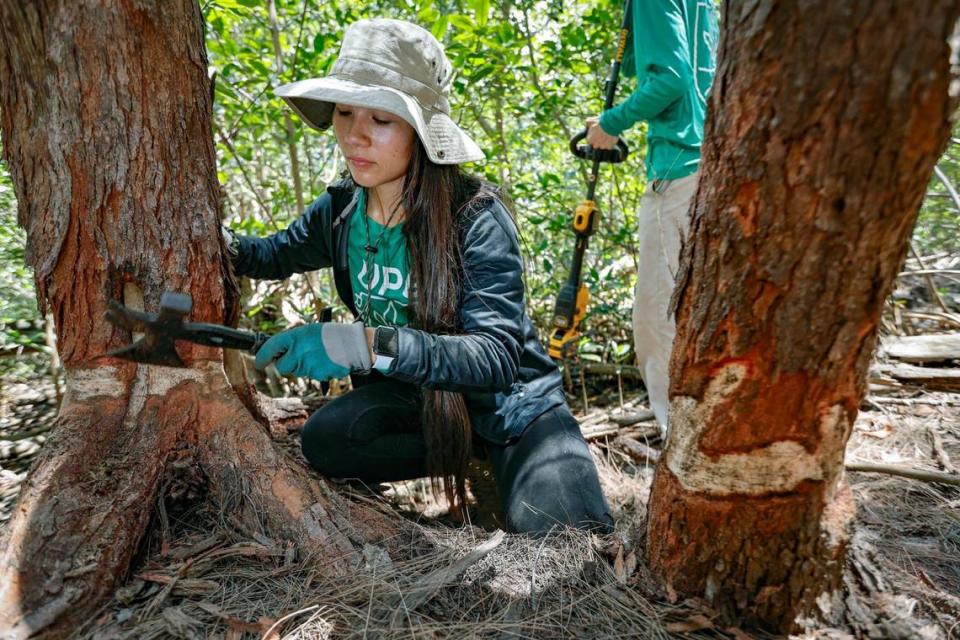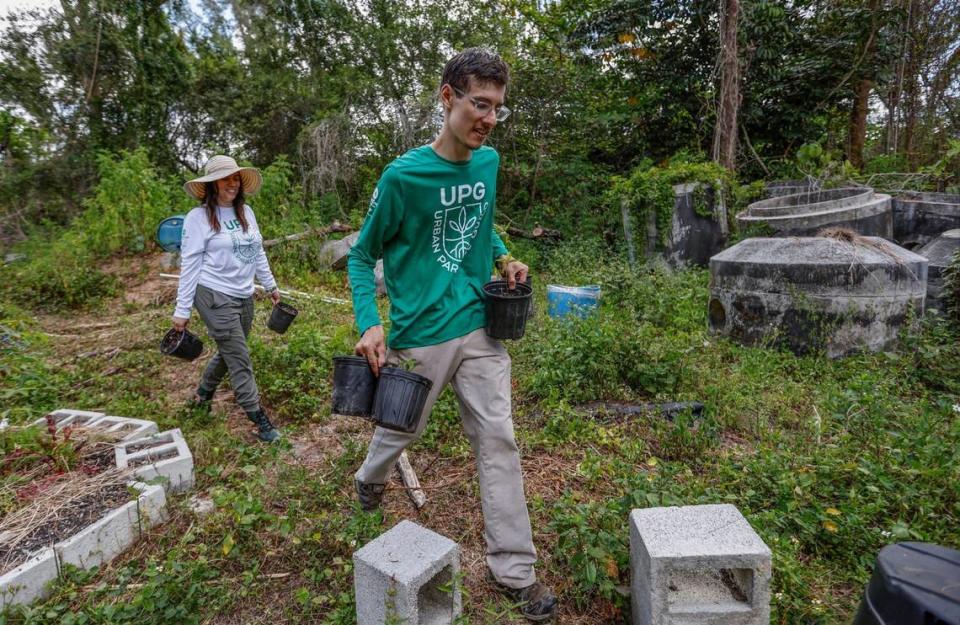Want a ‘green job?’ Paid Climate Corps training positions are now open in Miami
Between the White House launching the nascent American Climate Corps program and Miami-Dade County seeking $70M to bankroll climate technology careers, the “green jobs” industry in South Florida finally shows signs of taking off.
At the very least, groups that run job training programs are finally starting to see some real federal money and to take applications.
The first round of postings went up last week to join the American Climate Corps — an effort the Biden administration says is modeled after the New Deal jobs program created during the Great Depression. The goal is to put more than 20,000 young people to work in emerging industries seeking to fill shortages of skilled workers.
Two South Florida groups have already signed up to offer paid job training through the American Climate Corps: The Greater Miami Service Corps and the Miccosukee Tribe of Indians of Florida. Three other groups also have signed around the state.
Defining a “green” career can cover a lot of ground. On the newly launched federal government website, ClimateCorps.gov, there’s the option to choose between different areas like forestry, solar and renewable energy or wildfire prevention. But trade work, like learning new construction techniques or equipment installation and repair, also promises to a big part of green industries.
For now, the American Climate Corps positions are not permanent and the openings are limited. There are just 15 initial openings with the Greater Miami Service Corps, for instance. And the inaugural local green job training options are entry-level with pay that reflects that. But the White House touts the program as one that it hopes will lead to “good-paying” union job around the country.
“We will put tens of thousands of young people to work at the forefront of our climate resilience and energy future, clean energy future,” President Joe Biden said during an Earth Day announcement last month that kicked off the program.

In South Florida, such job-training programs have been around for decades — but the American Climate Corps effort could eventually bring lots more money to support the efforts.
The Greater Miami Service Corps has been in operation for more than 33 years, mostly working with young people between 18 and 24 who graduated high school or never finished. They partner with YouthBuild, a non-profit funded by the Department of Labor, to help them get their GED while training them to do in-demand work like removing septic tanks, pouring concrete, changing heating and air-conditioning systems, fixing planes and painting buildings.
Most recently, they partnered with TEDc, an affordable housing development company in Liberty City. Trainees there are learning plumbing, masonry, carpentry and possibly electrical as they turn over units for new rentals. They follow a curriculum of sustainability practices from the National Center for Construction Education and Research.
“One of the biggest challenges for us is finding qualified employees,” said Miguel Zaldivar, construction manager for TEDc. “We’re hoping with the hands-on training, they can eventually come on board with our team.”
While not all the training at the Greater Miami Service Corps is for green jobs, with funding from Volunteer Florida in 2023, they started a “green corp.” Some members help maintain green spaces in city parks and others visit residents’ homes around the community and install water and electric upgrades, like LED light bulbs, caulking and low-flow faucets.
Kenyon Williams, 19, joined the Greater Miami Service Corps in 2019. Last week, he cleaned a resident’s air-conditioning filter — basic but often-ignored maintenance that can improve energy efficiency and reduce bills.
“Before I joined I just sat around the house not really doing nothing, so I just made the best use of myself and applied,” Williams said. “Now I know I want to go into a career in HVAC.”
Tuwanda Nickerson, whose disabled father lives at the house Williams serviced, said the Greater Miami Service Corps helped them “tremendously.”
“The bill has gone down at least $50,” Nickerson said.
Debbie Dorsett, the executive director of the Greater Miami Service Corps , said the nonprofit has been supported by a mix of state, federal and sources of funding over the years. She hopes joining the federal climate corp training program will bring in more money and job candidates.
“It’s in alignment with the work that we’re currently doing, and will provide future opportunities for us to expand our services within the climate change area,” Dorsett said.
Beginning this summer, every American Climate Corps member will also be able to have access to apprentice programs designed to assist women, veterans, and communities of color to start and keep careers in the construction industry. Climate Corps training is also intended as an expedited pathway into working with the federal government.
The future of the Climate Corp, however, may hinge on decision in Washington. In a current budget proposal, the White House is seeking $8 billion from Congress to scale up the program and add 50,000 new openings each year through 2031. That might not happen, so for now, funding is coming from other federal programs like the Department of Labor’s YouthBuild and Americorps.

Climate Apprentices
Though limited for now, the hope is that the list of job and training options added to the American Climate Corps website will grow as more organizations decide to collaborate. The Urban Paradise Guild (UPG), a conservation non-profit in Miami-Dade, is also considering the White House’s invitation. The Urban Paradise Guild fights the climate crisis through nature based solutions, education and policy-work, Jackeline Bonilla, the executive director of the Urban Paradise Guild said.
The organization received federal funding from Americorps for the first time in July, and with it, they were able to launch a paid “climate apprenticeship” program.
“Climate apprentices use skills to fight the climate crisis,” Bonilla said. “This is for everyone, for people taking a gap-year, new retirees, for second chances and we will teach you how to work with nature.”
Climate apprentices work 20 hours a week doing more physically intensive projects outside, like removing invasives in the dry season and planting trees in the wet season. For 10 hours a week, the apprentices pick a selected specialty to work on.
Viviana Acevedo picked urban forestry as her climate apprentice specialty.
“My culture, my family’s Indigenous Mexico, has been ingrained in me since I was younger,” Acevedo said. “I have always had a respect for nature, but I got to a point where not only do we need to respect but we need to protect it.”
Acevedo wants to be a veterinarian when she is older. One of her jobs at UPG is to monitor a bird island, and the team is working on policy to get the birds protected.
“It’s one thing to sit and watch the nature channel, but it’s another thing to come out and actually be here,” Acevedo said. “These are things that I personally care about, and that I’m passionate about. But it’s also things that will help me in my career.”
Apprentices get a $ 1,725-a-month stipend and an educational reward of more than $4,800 if they commit to 1,200 hours. Bonilla acknowledges the money isn’t enough to afford living expenses in Miami, but they try to support the apprentices by giving them access to food grown in the farm share garden in Hialeah.
The applications are on a rolling class basis, and they have two people in the program, and 25 slots available. There are openings for Creole and Spanish climate education, farming, nursery managing, landscaping and more. They are also looking for an assistant to help organize some of the data and recruitment for the climate apprenticeship program for $29,400 a year.
ClimateReady Tech Hub
There is also the hope for higher-paying green jobs on the horizon.
Miami-Dade also was designated by the U.S. Department of Commerce’s Economic Development Administration (EDA) as a technology hub in October 2023, according to the Miami-Dade county website. The ClimateReady Tech Hub did not respond to the Miami Herald for comment. The Hub is seeking $70M from the EDA for the region to create 23,000 jobs with a average base salary of $83,000. The county said this will add $41B to the regions market value.
Of the 23,000 jobs the Hub will create, at least 15,100 positions should be filled with “underrepresented” people.
There are 60 partners spanning businesses, government, higher education, workforce, and community organizations in the tech hub and they’re focused on three projects: infrastructure, coastline protection and energy efficiency.

How to apply:
▪ Greater Miami Service Corps: The deadline for application to apply is July 31. Pay for the training positions is $13.88 an hour.
▪ The Miccosukee Tribe of Indians: The deadline to apply is May. Trainees will work with the U.S. Fish and Wildlife Service to collect data on the hydrologic changes to the tree islands in the Everglades. Pay for the position is $15 an hour.
▪ Urban Paradise Guild Climate Apprentice: They are accepting on a rolling basis. The application to apply is here. It offers a $ 1,725-a-month stipend and an educational award of $4,800 with the completion of the program.
Ashley Miznazi is a climate change reporter for the Miami Herald funded by the Lynn and Louis Wolfson II Family Foundation in partnership with Journalism Funding Partners.

